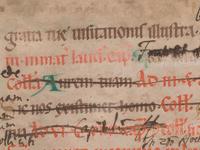
PRESENTERS: Andrea Myers Achi ~ Stefanos Alexopoulos ~ Jesse Billett ~ Harald Buchinger ~ Donna Alfano Bussell ~ Ann Marie Caron ~ Nathan Chase ~ Daniel Galadza ~ Nina Glibetic ~ Richard Gyug ~ Sarah Hamilton ~ Andrew Irving ~ Rebecca Maloy ~ Rob Meens ~ David Michelson ~ Agnes Mihalyko ~ Elena Nonveiller ~ Gabriel Radle ~ Els Rose ~ Gerard Rouwhorst ~ Carol Symes ~ Kris Trujillo ~ Arthur Westwell
Organized by Professor Henry Parkes and ISM Fellow Peter Jeffery
To study the history of the Christian liturgy is usually to study texts. Though some texts survive even from the period of the early Church, it was mostly during the Middle Ages that thousands of texts—prayers, hymns, and lections—were compiled and organized into large and complex liturgical books. Some of these medieval liturgical books continued to be used by worshippers even into modern times, or served as models or anti-models for compilers of post-medieval liturgical books.
When we study these centuries-old documents, it is easy to assume that each text is a straightforward prescription of what was said and done. But liturgical books and texts have served many purposes; those who used them had many reasons. A ritual is, after all, an action or performance—the textual dimension is only one among many. Written texts could explain, record, order, and nuance; they could permit reflection, study, and emendation; they could give substance to otherwise intangible concepts, actions, and traditions, permitting the exchange and replication of practices; they could aid learning and memory; books could be physically carried and used within the rituals they describe; and they could communicate authority, correctness, entitlement, and power. Of course, medieval liturgical texts continued to be read in many ways long after the Middle Ages ended. We too, working in different modern fields, have a wide range of reasons for reading these texts.
Moving beyond the notion that writing was simply a means of coordinating ritual activity, or an alternative to oral transmission, Medieval Rites: Reading the Writing will explore the breadth of possible literate interactions with Christian liturgy during the Middle Ages, in both Eastern and Western traditions.
Friday, April 21 | 1 - 5:15 pm
Beinecke Rare Book & Manuscript Library
(121 Wall St., New Haven)
Saturday, April 22 | 9 AM - 5:30 PM
Sunday, April 23 | 9 AM - 12:30 PM
Stoeckel Hall Room 106
(96 Wall St., New Haven)
SCHEDULE
Friday, April 21
1.00 PM Introductions and Welcome
1.15-2.45 | Session I: Form and Function
CHAIR: Juliette Day
· Stefanos Alexopoulos (The Catholic University of America) Medieval Byzantine Scrolls of the Office of Holy Communion: Is Form Related to Function?
· Andrew J. M. Irving (Rijksuniversiteit Groningen) The Inclusion of the Canon in the Mass Book: Some Preliminary Observations
· Ágnes T. Mihálykó (University of Oslo) Reading the Earliest Liturgical Manuscripts: Liturgical Papyri and their Uses
3.45-5.15 | Session II: Erring and Correcting
CHAIR: Henry Parkes
· Richard Gyug (Fordham University) Correcting a Missal: Language and Liturgy in a Beneventan Manuscript (Montecassino, Archivio dell’Abbazia, Compactiones VII + XXII)
· Andrea Myers Achi (Institute of Fine Arts, New York University) Illuminated Mistakes: Aesthetics versus Legibility in a Coptic Liturgical Manuscript from the Monastery of St. Michael, Egypt
· Sarah Hamilton (University of Exeter) Supplementary Texts: The Evidence of ad hoc Excommunication Formulae
Saturday, April 22
9-10.30 | Session III: Liturgy in Community
CHAIR: Melanie Ross
· Gabriel Radle (Princeton University) Liturgical Books as Agents of Identity Formation: Medieval Sacramentaries and Life-Cycle Rituals
· Elena Nonveiller (Centre d’études en sciences sociales du religieux, Paris – EHESS) The Broumalia Feast from Rome to Byzantium: Continuity or Ideological Re-making?
· Rob Meens (Utrecht University) Healing Rifts? The Reconciliation of Altars and Churches in the Early Middle Ages
11-12.30 | Session IV: Emerging Book Types
CHAIR: Vasileios Marinis
· Nina Glibetic (Institute for Advanced Study, Princeton) The Scroll as Ritual Object in Medieval Byzantine Liturgical Practice
· Daniel Galadza (University of Vienna) After Sacraments: Prayers and Blessings for “Various Occasions” in the Euchologion
· Nathan Chase (University of Notre Dame) The Homiliae Toletanae and the Theology of Lent
2-3.30 | Session V: Liturgical Exegesis
CHAIR: Teresa Berger
· Innocent Smith O.P. (Priory of St. Vincent Ferrer) Liturgical Prayers in 13th-century Scholastic Theology
· Donna Alfano Bussell (University of Illinois at Springfield) Who do you love? Cistercians and the Magdalene Liturgy
· Rebecca Maloy (University of Colorado Boulder; Institute for Advanced Study, Princeton) Liturgy as a Form of Exegesis and Education in Visigothic Iberia
4-5.30 | Session V: Text and Performance
CHAIR: Bryan Spinks
· Gerard Rouwhorst (Tilburg School of Catholic Theology, Tilburg University) The Ritual Performance of Liturgical Syriac Poetry
· Carol Symes (University of Illinois at Urbana-Champaign) The Liturgical Texts of Domesday Book
· Els Rose (Utrecht University) Text and Performance in Merovingian Liturgical Sources
Sunday, April 23
9-10.30 | Session VII: Reading
CHAIR: Jessica Brantley
· Kris Trujillo (University of California Berkeley) Undoing Cistercian Literacy
· Ann Marie Caron (University of Saint Joseph, West Hartford) Liturgical Rites and Visionary Texts: The Seasons and Feasts of Liturgical Year in Book One of the Book of Special Grace
· David A. Michelson (Vanderbilt University) “The Book of Psalms Abounds with Every Other Kind of Book”: Syriac Monastic Readers and the Divine Office
11-12.30 | Session VIII: Reform
CHAIR: Peter Jeffery
· Arthur Westwell (University of Cambridge) The Standards of Correctio: Bishops’ Handbooks from Carolingian Italy
· Harald Buchinger (Universität Regensburg) Tradition in Context: Aspects of the liturgical year in early monastic reform Consuetudines
· Jesse D. Billett (Trinity College, Toronto) Chant on the Edge: Antiphoner Texts Among the Marginalia of Cambridge, Corpus Christi College, MS 41